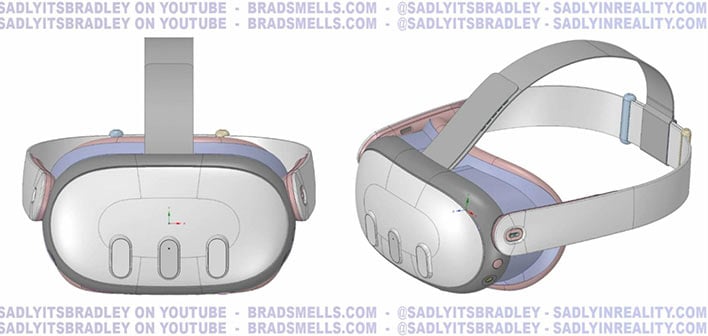Selected journalists and analysts have had the opportunity of some hands-on time with the
Meta Quest 3 prototype. Reports seem very positive, with the greatest improvements observed in the areas of mixed reality (video pass-through) and overall performance (new Qualcomm chip). Will the prospect of this upcoming Quest 3 kill the much more expensive
Apple Reality Pro HMD stone dead?
Bloomberg's
Marc Gurman framed his comparison of the new Meta Quest 3 against the Apple Reality Pro - to fit with his audience. Within his analysis, he mixed up comparisons between the Apple device, and two generations of Meta Quest. However, to begin our overview of the Meta Quest 3, it seems more logical to first compare it with its well established and well known predecessor.
It was immediately apparent to the Bloomberg reporter that the Quest 3 is both lighter and thinner than the Quest 2, and featured a stronger strap with a fabric material by default. Another quite striking change to the new Meta device is the new front, featuring three vertical lozenge shaped sensors. To the left and right are color pass through cameras, and a standard camera with depth sensor (a Quest first) is located centrally.
Using the stereo color cameras, the Quest 3 offers very capable video pass-through. Meanwhile, the depth sensor will be used by Meta for environment meshing, to automatically identify surrounding walls (etc) where you are interacting. Previously the Quest had non-color cameras so pass through wasn't as good, and had manual IPD adjustments (headset off).
For mixed reality, the new color cameras on the front lift the Quest 3 far above its predecessor. Gurman says that the quality of the pass-through had excellent color reproduction and "offered an almost lifelike rendering of the real world." Providing an example of the clarity on offer, Gurman said he could use his phone without difficulty while wearing the headset.
Some other outwardly observable hardware changes include the presence of tracking cameras, located on the lower front sides of the Quest 3, as well as a volume rocker and wheel for IPD adjustment.
Display resolution is thought to be "slightly higher" than the Quest 2, but specs weren't confirmed. Performance hasn't been neglected with the Quest version upgrade. Meta's new Quest 3 was "much improved over the Quest 2," in terms of both app launching and playing games. Performance increases are thought to be the result of the use of Qualcomm's latest Snapdragon XR2 chip.
Redesigned controllers from the Quest 2 are to be more like the Quest Pro, indicates Gurman, but without the built-in cameras. This is a step back for hand tracking, but may be offset by some other tech changes not immediately apparent.
The Meta Quest 3 is expected to come in at a premium over the Quest 2's
regular price ($399). There are rumors that Meta will thus keep the Quest 2 option open for a lower entry point. Meta's Quest Pro price dropped to $999 in March, but there is still a large gap between it and the Quest 2.
Gurman frames a lot of his Quest 3 demo testing not just with reference to the Quest 2, but with the knowledge that Apple is teeing-up to reveal the highly anticipated Apple Reality Pro (or whatever it might be called). Much more about the Apple device is expected to become clear
during the WWDC, which runs from June 5 to 9.
We already mentioned that the Meta Quest 3 will lack controller cameras present on the
Quest Pro. This will also make it different (inferior?) to the Apple device, according to Gurman. Another advanced feature which would have been nice for the Quest 3, but is missing, is foveated rendering. This is a rendering technique which follows the wearer's gaze to concentrate rendering quality right where attention is focused. This can save processing power for increased quality (where it counts) and energy efficiency.
Apple's headset is expected to be sold at multiples of the Quest 3's price. How it will attract users into paying such a price remains to be seen, but it hopefully has a killer app (or several) to reel-in customers. The Quest Pro 'bombed' according to Bloomberg, so Apple execs may be nervous about the potential for sticker shock.

